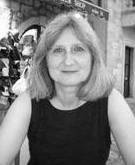 Katharina Wolf-Grießhaber (born 1955), studied Slavic Studies and East European History in Heidelberg and Bochum and completed her doctoral degree in Bielefeld. She lives in Münster and works as a freelance translator.
Katharina Wolf-Grießhaber (born 1955), studied Slavic Studies and East European History in Heidelberg and Bochum and completed her doctoral degree in Bielefeld. She lives in Münster and works as a freelance translator.
Excerpt from an Interview
Portrait of: Katharina Wolf-Grießhaber, translator from Croatian, Bosnian and Serbian
How did you end up working as a translator from Bosnian, Serbian and Croatian?
Completely by chance. In 1986 I met Danilo Kis with whom I discussed literature. He advised me to start translating literature. I began with translating his Mansarda. All other translations that ensued fell in place by themselves.
The languages from which you translate are rather small languages. What does this mean for the presence and awareness of literature in German-speaking areas?
Some publishers are willing to publish books from these languages. The print run however is rather small. Reviewers definitely notice these books, yet the number of readers remains low despite favorable reviews.
Often we witness certain political or social issues becoming popular, bearing in mind for instance the wars in the Balkans and Georgia in the past year. Then the interest for literature also grows, which however equally quickly subsides once the issue ceases to raise interest. To what degree do these thematic booms influence your work and the books you choose to translate?
Amongst the books I translate one can find volumes of essays on war, e.g., Dying in Croatia by Slavenka Drakulic (1992). Ivan Colovic reflects on the ideological foundations of war from an anthropological perspective in his Brothel of Warriors (1994). Emir Suljagic described the live in an enclave before the mass murder on Muslims in his book Srebrenica – Notes from Hell (2009). These books raised my interest. Without the war I surely would not have translated them. However, the influence is limited to these books. The books which I usually translate get published, I believe, independent of these types of booms.
What kind of readers are typical for the type of literature you translate?
S/he is interested in and open for the Other.
Which authors have you translated, and of those which more gladly than others and why?
i.a. Danilo Kis, Bora Cosic, Dzevad Karahasan.
On Danilo Kis I wrote my doctoral thesis. I am impressed by his literary virtuosity which was a great challenge for me. With Bora Cosic I am taken by the humor which in some books is married with melancholy. I am close to both authors. In comparison I am attracted specifically to the Other in Dzevad Karahasans texts. With him I have much less in common than with the other two. It is more difficult for me to understand him and his figures, but I think that I am nonetheless successful.
by Claudia Dathe
Relying on the structure and methodology of classical and postclassical [...]
For further information on translation, the TransStar project and the [...]
Relying on the structure and methodology of classical and postclassical [...]
Sir or Madam, In co-operation with KulturKontakt Austria, the Austrian [...]
Five short films with translations (videopoetry) were made as part [...]
Translating Cube: Six Sides of European Literature and Translation Berlin, [...]
Programme (PDF)
Five short films with translations (videopoetry) were made as part [...]
Translating Cube: Six Sides of European Literature and Translation Berlin, [...]
Programme (PDF)
Translating Cube in Tübingen Reinold Hermanns: SWR2 Journal am Mittag, [...]
Being Exchanged: Between Paris, Stuttgart and Ivano-Frankivsk Yuri Andrukhovytsh, Lubomír [...]
Five short films with translations (videopoetry) were made as part [...]
Bookstore: http://www.edition-fototapeta.eu/geschichten-erzaehlen
More here (PDF). Bookstore: https://knjigarna.ff.uni-lj.si/si/izdelek/1623/pet-poti-do-prevoda/
Five short films with translations (videopoetry) were made as part [...]
Bookstore: http://www.edition-fototapeta.eu/geschichten-erzaehlen
More here (PDF). Bookstore: https://knjigarna.ff.uni-lj.si/si/izdelek/1623/pet-poti-do-prevoda/
Translating Cube: Six Sides of European Literature and Translation Berlin, [...]
Programme (PDF)


